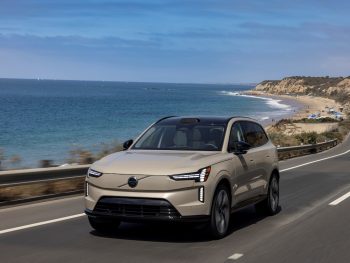Volvo ditches 2030 all-electric goal
Volvo has rowed back on plans to only sell fully electric cars by 2030 on the back of slow demand for EVs.
 The carmaker, which announced its EV goal back in March 2021, said it had decided to adjust its electrification ambitions due to changing market conditions and customer demands. It also cited slower-than-expected rollout of charging infrastructure, withdrawal of government incentives in some markets and additional uncertainties created by recent tariffs on EVs in various markets.
The carmaker, which announced its EV goal back in March 2021, said it had decided to adjust its electrification ambitions due to changing market conditions and customer demands. It also cited slower-than-expected rollout of charging infrastructure, withdrawal of government incentives in some markets and additional uncertainties created by recent tariffs on EVs in various markets.
Rather than going pure electric by the end of the decade, the Swedish carmaker has now said it’s aiming for 90 to 100% of its global sales volume by 2030 to consist of electrified cars – this includes fully electric and plug-in hybrid models.
The remaining 0-10% will allow for a limited number of mild hybrid models to be sold, if needed.
Volvo stated that its long-term aim remains to become a fully electric car company, and it also aims to reach net zero greenhouse gas emissions by 2040.
By 2025, its percentage of electrified products is expected to stand at between 50 and 60% and the carmaker will have a full line-up of electric cars well before the end of this decade that will enable the move to full electrification “as and when the market conditions are suitable”.
However, it will also continue to develop its plug-in and mild hybrid cars, providing “a balanced portfolio that serves as a clear bridge to an all-electric future”.
In Q2 2024, Volvo’s share of fully electric cars stood at 26% – said to be the highest share among all its premium peers. Its electrified share – EVs and plug-in hybrids – accounted for 48%.
The change to its EV-only target is not expected to have any material impact on the company’s capital expenditure plans.
Since announcing its ambition to go fully electric, Volvo has launched five fully electric models: the EX40, the EC40, the EX30, the EM90 and the EX90, with the latter now starting deliveries.
“We are resolute in our belief that our future is electric,” said Jim Rowan, chief executive of Volvo Cars. “An electric car provides a superior driving experience and increases possibilities for using advanced technologies that improve the overall customer experience.”
But Volvo said it’s also seeing the popularity of its plug-in hybrids continue to grow, with the XC60 the best-selling plug-in hybrid model in Europe this year, according to industry data.
It’s also called for stronger and more stable government policies to support the switch to EVs.
Rowan continued: “It is clear that the transition to electrification will not be linear, and customers and markets are moving at different speeds of adoption. We are pragmatic and flexible, while retaining an industry-leading position on electrification and sustainability.”

